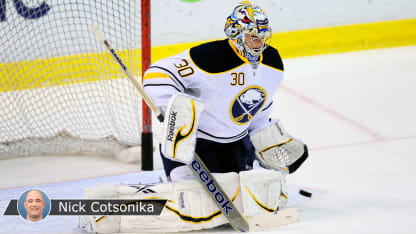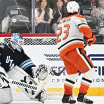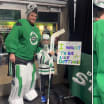Miller's love of game paves way to U.S. Hockey Hall of Fame
Holds NHL record for wins by United States-born goalie

"It never occurred to me I had to stop playing hockey, like, ever," he said with a laugh. "I wanted to find ways to keep going. That goes all the way back to minor hockey. I just kept wanting to play, play, play."
Perhaps that explains him, though.
Miller comes from a hockey family. He loves the game down to the smallest details, and he's competitive, intelligent and focused. He stays in the moment.
That helped him win 391 NHL games, the record for goalies born in the United States; the Vezina Trophy in 2009-10, when he was voted the NHL's top goaltender; and a silver medal at the 2010 Vancouver Olympics, when he led the United States to overtime of the final against Canada and was named the most valuable player of the tournament.
He will be inducted into the United States Hockey Hall of Fame in St. Paul, Minnesota, on Wednesday with Steve Cash, Jim Johannson, Jocelyne Lamoureux-Davidson and Monique Lamoureux-Morando.
Asked what he hopes his legacy will be, Miller said he hopes he'll be remembered for how he approached the game, wanted to be the best each night and tried to be a good teammate. Then he added this:
"I'm very grateful that I've had the chance to do the thing I've really loved to do and do it so many times," he said. "I got to tie my skates a lot, and I always enjoyed it. If people could sense that, I hope that would be the inspirational part of it.
"I loved to play, and I loved to compete, and I hope they enjoyed that part of watching. I hope I pushed and raised the bar a little bit because that's what everyone before me did."
Born in East Lansing, Michigan, Miller is one of 10 members of his family to play for his hometown university, Michigan State, and one of five to go on to the NHL. Like his cousin Kip Miller did in 1990, he won the Hobey Baker Award as the top player in NCAA men's hockey in 2001. His NCAA record for career shutouts (26) stood for 20 years until Dryden McKay of Minnesota State surpassed him on Oct. 30, 2021.
After playing mostly for Rochester of the American Hockey League from 2002-05, Miller became the Buffalo Sabres' No. 1 goalie from 2005-14.
"I feel like I made my own way in Buffalo and really kind of grew up there with my teammates," Miller said. "It holds a special place in my heart.
"Our teams were super talented. I was lucky enough to play with some tremendous players who were motivated to make it, and everything just kind of clicked. We had a great team. We all were confident, and we worked for it.
"The time in Buffalo is really the peak."
Miller set Buffalo records for games played by a goalie (540) and wins (284). The Sabres won the Presidents' Trophy as the NHL's top regular-season team in 2006-07, the second straight season they advanced to the Eastern Conference Final. His No. 30 will be retired at KeyBank Center on Jan. 19.
"He was really the backbone, because they had the offensive talent, and then he was in net making sure those guys could kind of freewheel and do their thing," said Chicago Blackhawks forward Patrick Kane, who grew up in Buffalo, played against Miller in the NHL and played with him for the United States.
At 6-foot-2, 170 pounds, Miller used his frame to his advantage.
"He was big in the net," Kane said. "He knew how to take up a lot of space. You really had to get him moving or get him guessing at times because if he was just taking a shot straight on, it was hard to score on him."
When Miller won the Vezina in 2009-10, he went 41-18-8 with a 2.22 goals-against average, a .929 save percentage and five shutouts. His 41 wins accounted for all but four of Buffalo's wins that season, and they remain the Sabres' single-season record.
"That's another guy that was a really good competitor, that played the game the right way," said Hockey Hall of Fame goalie Martin Brodeur, who faced Miller with the New Jersey Devils. "It was always a tough game when we played Buffalo because he wasn't going to give up much."
Miller went 5-1-0 with a 1.30 goals-against average and .946 save percentage at the 2010 Vancouver Olympics. After five straight wins -- including a 5-3 victory against Canada in the preliminary round -- he made 36 saves in a 3-2 overtime loss to Canada in the final.
"Being a competitor, it's still hard to accept that we got that far and we weren't able [to] take home the gold," Miller said. "But there's a good feeling about the guys on that team and what we accomplished.
"We were definitely not favored in the tournament. It was supposed to be a transition year for USA Hockey. We had some of the old guard, but we had some young guys. I thought we came together as a group and just kind of went for it and had a lot of fun doing it."
Miller went on to play for the United States at the 2014 Sochi Olympics and the St. Louis Blues at the end of 2013-14, then the Vancouver Canucks from 2014-17 and the Anaheim Ducks from 2017-21.
"I think we're very similar, in the way that we played for so long at a high level," said Hockey Hall of Fame goalie Roberto Luongo, Miller's foil in the 2010 Olympic final. "I think the consistency is what made him great. Every year, he was always putting up good numbers, and that's hard to do."
Toward the end of his career, Miller would stay on the ice with young Ducks forwards like Max Comtois and Trevor Zegras. They'd run through situations, work on breakaways, whatever. Miller said it was a good tradeoff: they'd learn; he'd have fun.
"I loved putting the skates on, even just practice and messing around," Miller said. "Any time I could be on the ice, it was a blast."
Miller retired after the 2020-21 season but in August, at age 42, he got the itch. Some guys were in Anaheim to train, and he let them know he wanted to scratch the itch if they needed a goalie. Sure enough, he ended up putting on the pads again.
"It was a nice scratch because I had some fun," Miller said. "It also reminded me it takes a lot of hard work to be at a high level."
Miller lives in California with his wife, Noureen DeWulf, and their son, Bodhi, 7, and daughter, Kaia, 7 months. One day, he might want a role with an NHL team. For now, he has found another way to keep going. In his second season as a consultant with the NHL hockey operations department, he provides input in multiple areas, including goalie interference.
"There's stuff happening every night that we want to be consistent on as we move through the season, so the playoffs run smoothly and everyone knows what the standard is," said Miller, who will work through this season and go from there. "It's not the same as stopping pucks, but it's still a good way to connect."

















